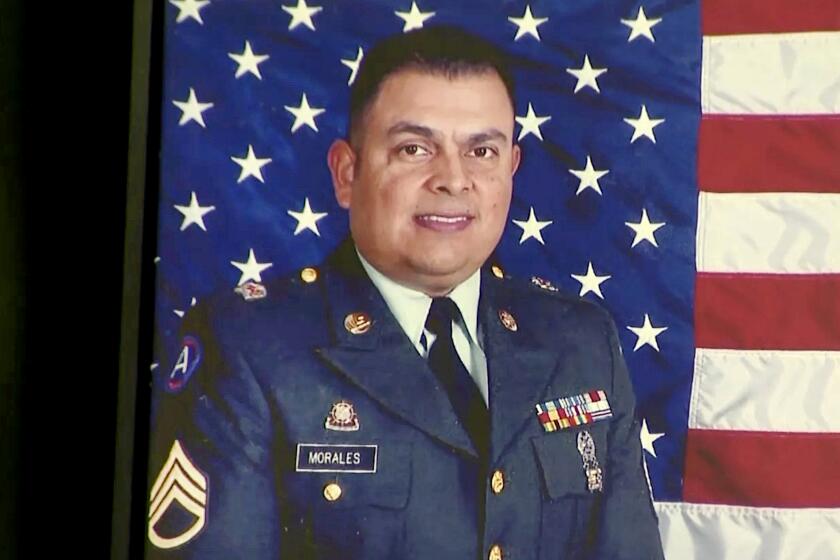30 years ago, a CHP officer was convicted of murdering a 20-year-old woman. The case still resonates
Longtime San Diego residents remember the names: Craig Peyer and Cara Knott. Those newer to the region may have noticed the sign denoting the Knott Memorial Bridge on Interstate 15 by Mercy Road, above the spot where Knott was killed.
Friday marked 30 years since a jury found Peyer, a California Highway Patrol Officer, guilty of murder in the death of Knott, a 20-year-old college student, who was pulled over by Peyer as she drove home.
The slaying of the San Diego State junior made headlines in late 1986.
But the arrest of Peyer less than three weeks later shook the region.
Women driving alone suddenly feared being pulled over by law enforcement officers in darkened areas. As Superior Court Judge Richard Huffman noted at Peyer’s sentencing hearing, the CHP officer “took advantage of a position of trust and confidence” — which would have a ripple effect in the community for a long time afterward.
“It terrorized everybody,” said Paul Pfingst, who back in the late 1980s was the new-to-town prosecutor tapped to handle Peyer’s retrial. The first trial Peyer faced had ended when the jury deadlocked.
“I have never seen a case that has such a direct impact on people’s perception of their safety, especially women,” Pfingst said. “It popped the bubble of perceived safety.”
Cara Knott’s mother, Joyce Knott, said last week that she “had not realized it was 30 years” since the guilty verdict, handed down on June 22, 1988.
“I think of the dates that have to do with her,” she said, “not that have to do with the trial.”
About 9:45 p.m. on Dec. 27, 1986, Cara called her family and said she was heading home to El Cajon from her boyfriend’s place in Escondido.
She never showed up. The family reported her missing and started to search. The next morning, her brother-in-law spotted her 1968 Volkswagen Beetle abandoned by a bridge on a frontage road just below I-15 at Mercy Road.
Police soon found her body, dumped from the bridge to the ground about 75 feet below. Her father, Sam Knott, was there when officers made the grim discovery.
The day after Cara Knott’s body was found, a TV reporter asked to talk to a CHP officer about how women could protect themselves when traveling alone at night. Authorities unwittingly sent her to Peyer, a 13-year CHP veteran with a clean record. (As it would turn out, he had scratches on his face that were immortalized in the TV interview.)
Within a week, homicide investigators turned their focus on Peyer.
Blood and fiber evidence linked Peyer to the crime. And women who’d been similarly pulled over by Peyer also came forward. There was other evidence, including a witness who saw Knott get pulled over.
Peyer’s first trial ended with the jury split 7-5, leaning toward conviction. The family wanted a new prosecutor. Pfingst, a New York transplant, was tapped to take the case.
The San Diego Tribune reported that Pfingst argued to the jury that Peyer had a “predatory nature” that involved stopping young women and ordering them down the secluded Mercy Road off-ramp near where Knott was killed. Pfingst suggested that Peyer and Knott had some sort of altercation, then Peyer, fearing she would report him, strangled her then tossed her body off the bridge.
On Thursday, Pfingst recalled sweating out the decision, waiting as the jury deliberated for days. And when they were all called back to the courtroom, the verdict about to be read, time seemed to suddenly slow down.
He remembers Joyce Knott was crying.
The verdict was such big news that the San Diego Tribune published a rare extra edition.
“I have been in this business for 44 years, and I have never seen a case affect a community like the Craig Peyer case,” Pfingst said Thursday. “The only thing that was comparable was Son of Sam back in New York.”
Peyer would be sentenced to 25 years to life. He has never admitted killing Knott.
In the years that followed, Sam Knott worked to establish the Cara Knott Memorial Oak Garden (now called the San Diego Crime Victims Oak Garden) in the Los Peñasquitos Canyon Preserve where his daughter’s body was found.
In 2000, after spending time at the garden, he died of a heart attack — very near the spot where his daughter died.
“I think about Sam a lot,” Pfingst said. “Sam never recovered from that day … and ultimately it killed him, right where his little girl died.”
The Union-Tribune reported in 2004 that, as part of a wrongful conviction project, authorities from the San Diego County district attorney’s office had asked Peyer if he wanted them to test DNA on key evidence.
He said no.
He was denied parole in 2004, and again in 2008.
In 2012, Peyer’s third bid for parole was rejected. The board also decided Peyer would not be eligible for parole again until 2027. Putting the date out 15 years was the longest time allowable under state law.
Peyer is 68. He remains in custody at the California state prison in San Luis Obispo. The attorney who represented him at his last hearing did not respond to a request for comment Thursday.
Joyce Knott spends no time thinking about her daughter’s killer. But she thinks every day about her daughter, the third of four siblings. She would be 52 now.
She remembers Cara as “tenderhearted.” She was an artist, an animal lover and a young woman who “always had time for everybody,” her mother said.
About 15 years ago, Joyce Knott decided to redecorate Cara’s room — “which takes some courage,” she said — and had the wallpaper pulled off. Underneath was a pleasant surprise: drawings of flowers. Words, too, starting with: “My name is Cara Evelyn Knott. I am 14 years old.”
“I appreciate the fact that people remember [her],” Knott said. “She’s always with us.”
teri-figueroa@sduniontribune.com
More to Read
Start your day right
Sign up for Essential California for news, features and recommendations from the L.A. Times and beyond in your inbox six days a week.
You may occasionally receive promotional content from the Los Angeles Times.





